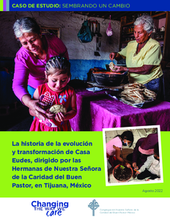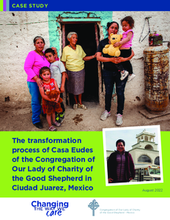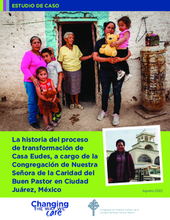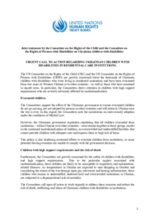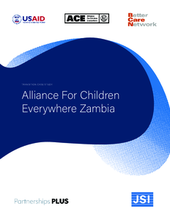Displaying 101 - 110 of 771
Para garantizar que las personas que han vivido en cuidados alternativos puedan participar de los procesos y decisiones para mejorar los sistemas de cuidado, Doncel junto a la Red Latinoamericana de Egresados de Protección, Better Care Network y Cambiando la Forma en Que Cuidamos (Changing The Way We Care en inglés) llevaron adelante el primer mapeo regional de activistas que vivieron en cuidados alternativos en América Latina y el Caribe.
Este estudio de caso destaca la transición de servicios de cuidado residencial a los basados en la familia y comunidad, realizado por las Hermanas de Nuestra Señora de la Caridad del Buen Pastor, en Tijuana B.C., México.
This case study highlights the transition of the Sisters of Our Lady of Charity of the Good Shepherd in Ciudad Juarez. It is an honest look at the emotional, logistical, and practical elements involved in transitioning from a residential care model which existed for more than 100 years to a provider of community-based and family-centered services.
Este estudio de caso destaca la transición de servicios de cuidado residencial a los basados en la familia y comunidad las realizado por las Hermanas de Nuestra Señora de la Caridad del Buen Pastor, en Ciudad Juárez, México.
Joint statement by the Committee on the Rights of the Child and the Committee on the Rights of Persons with Disabilities on Ukrainian children with disabilities. They express concern about the thousands of Ukrainian children with disabilities who were living in residential institutions and have been evacuated from war zones to Western Ukraine or to other countries, as well as those who have remained in unsafe areas. In particular, they draw attention to children with high support requirements who are negatively affected by institutionalization.
This case study highlights the transition of the Sisters of Our Lady of Charity of the Good Shepherd in Tijuana. It presents the highs and lows that come with a change process of moving from residential care to community-based services focused on family strengthening.
Alliance for Children Everywhere (ACE) Zambia is a US-funded organization that transitioned from providing residential care in Zambia to pioneering family-based care, including foster care, and supporting other residential care service providers to transition. With important links to the Zambian government, ACE Zambia has been a key actor in supporting the development of policies, programs and guidelines that are now utilized across the country.
Based in Uganda, Child’s i Foundation successfully transitioned their residential programs before deciding to expand their vision and seek to bring about care reform to the entire district of Tororo. Partnering with the district level government and several CCIs, Child’s i Foundation carried out an extensive analysis and assessment of the Tororo region which provided information to guide the ensuing transitions of CCIs throughout the region.
During 2021-2022, Changing the Way We Care in partnership with three civil society institutions: Keystone Moldova, Child, Community and Family (CCF Moldova) and Partnerships for Every Child (P4EC), conducted a series of assessments on the national level, including a complex evaluation of six residential institutions (RI).


